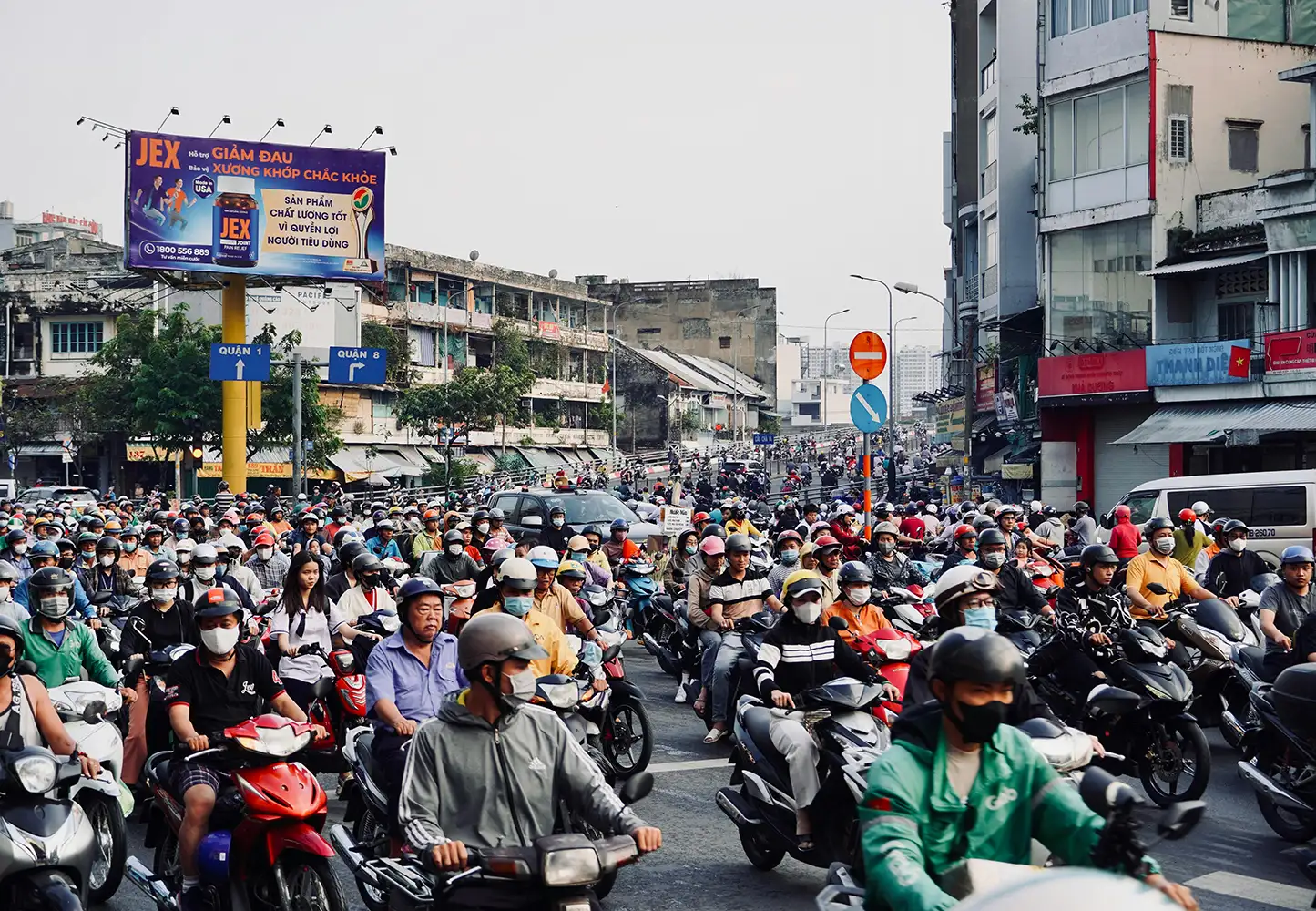
Vietnam two-wheeler market: The shift to electrification
Vietnam’s streets are dominated by two-wheelers—motorcycles and mopeds that serve as the primary mode of transport for millions of people. In 2023, more than 74 million two-wheelers were registered in the country, comprising more than 90% of the motorised vehicle fleet. The nation’s two-wheeler market is the second largest in the ASEAN (Association of Southeast Asian Nations) region after Indonesia.
This article is based on a report published by the International Council on Clean Transportation (ICCT) in February 2025, titled “Fuel Consumption Baseline Analysis for Two-Wheelers in Vietnam, 2017–2023.” The report, authored by Huong Le, Dinh-son Tran, and Francisco Posada, provides a comprehensive assessment of Vietnam’s two-wheeler market trends, fuel consumption, and emission performance over recent years. The findings of this study will provide a basis for developing mandatory fuel consumption standards for two-wheelers, aiming to lower CO₂ emissions across Vietnam’s transport sector.
ICCT is an independent research organisation focused on advancing transportation policies that improve efficiency and reduce emissions worldwide.
A growing but shifting market
Vietnam’s two-wheeler industry has traditionally been led by major Japanese manufacturers. Between 2017 and 2021, more than 250 models from over 60 brands were available annually. However, despite a robust demand, the market has experienced a decline in sales. In 2021, new two-wheeler registrations fell to 2.89 million units—the lowest level in 15 years. The COVID-19 pandemic further accelerated this trend, disrupting manufacturing and consumer purchasing power.
Nevertheless, amidst this decline, one segment has continued to grow—electric two-wheelers (E2Ws). Their market share rose from a mere 1.2% in 2017 to 10.4% in 2021, with sales skyrocketing from 39,700 units in 2017 to 288,000 in 2021. This shift marks the beginning of a larger transition away from internal combustion engine (ICE) two-wheelers, a crucial step towards reducing the sector’s environmental impact.
Unlike the ICE two-wheeler market, which is dominated by Japanese giants such as Honda and Yamaha, the electric two-wheeler segment is led by domestic brands, including VinFast, Pega, and Anbico. Vietnamese manufacturers now account for more than 70% of new E2W sales, with VinFast emerging as the clear leader.
The majority of electric two-wheelers sold in Vietnam are e-mopeds, which have lower power output and limited speed compared to e-motorcycles. A significant proportion of these vehicles still rely on lead-acid batteries, which accounted for more than 70% of the market share annually. However, lithium-ion batteries are gradually gaining traction due to their longer lifespan and superior performance.
Fuel consumption and emission trends
Vietnam has committed to reducing greenhouse gas (GHG) emissions in line with the Paris Agreement. As part of its Nationally Determined Contributions (NDC), the country has introduced regulations aimed at curbing fuel consumption in newly manufactured, assembled, and imported motor vehicles. Given that motorcycles and mopeds make up the bulk of Vietnam’s transport emissions, these regulations are crucial for achieving climate goals.
The fuel consumption baseline study of two-wheelers in Vietnam from 2017 to 2021 revealed that the average fuel consumption of the conventional ICE fleet increased from 1.86 L/100 km in 2019 to 1.92 L/100 km in 2021. However, when factoring in electric two-wheelers, the overall fleet’s fuel consumption declined, showing a 10.4% reduction in 2021 compared to a fleet excluding E2Ws. This demonstrates the positive impact of electrification in improving energy efficiency and reducing emissions.
Challenges to electrification
Despite the growing adoption of electric two-wheelers, several challenges remain. One major hurdle is the inadequate charging infrastructure. Unlike countries with well-developed electric vehicle ecosystems, Vietnam still lacks widespread and accessible charging stations. Many consumers are hesitant to switch to E2Ws due to concerns over charging convenience and battery replacement costs.
Another significant challenge is the reliance on lead-acid batteries, which are cheaper but environmentally harmful. The transition to lithium-ion batteries is necessary for long-term sustainability, but high production costs and limited supply chains pose obstacles to widespread adoption.
Moreover, ICE two-wheelers still dominate Vietnam’s market, with diesel and petrol-powered motorcycles making up the majority of sales. The transition to electrification will require strong policy interventions, including incentives for consumers and manufacturers to accelerate the shift towards cleaner alternatives.
Policy and market outlook
The Vietnamese government has begun taking steps to encourage the adoption of fuel-efficient and electric two-wheelers. Possible policy measures include tax incentives for E2W purchases, investment in charging infrastructure, and stricter fuel efficiency standards for ICE vehicles.
China and India, both major two-wheeler markets, have already implemented stringent fuel economy standards and aggressive electrification targets. Vietnam has the opportunity to follow suit by becoming a regional leader in sustainable two-wheeler transport. Establishing mandatory fuel efficiency standards for motorcycles and mopeds could significantly reduce CO2 emissions while providing economic benefits through lower fuel consumption.
The road ahead for Vietnam’s two-wheeler industry
Vietnam’s two-wheeler industry is at a crossroads. While ICE motorcycles continue to dominate, the rapid growth of electric two-wheelers signals a shift towards cleaner, more sustainable mobility. To sustain this momentum, key stakeholders—including the government, manufacturers, and infrastructure providers—must work together to overcome existing barriers and drive further electrification.
Heavy reliance on fossil fuel-powered vehicles has contributed to severe air pollution, exacerbating public health concerns such as respiratory illnesses. As Vietnam strives to meet its environmental commitments, a transition towards more fuel-efficient and electric two-wheelers is becoming essential, according to the ICCT report.
With proactive policies, improved charging infrastructure, and increased consumer awareness, Vietnam can build a future where two-wheelers not only remain the backbone of urban mobility but also contribute to a greener, healthier environment.
To download this report, visit the ICCT website.








